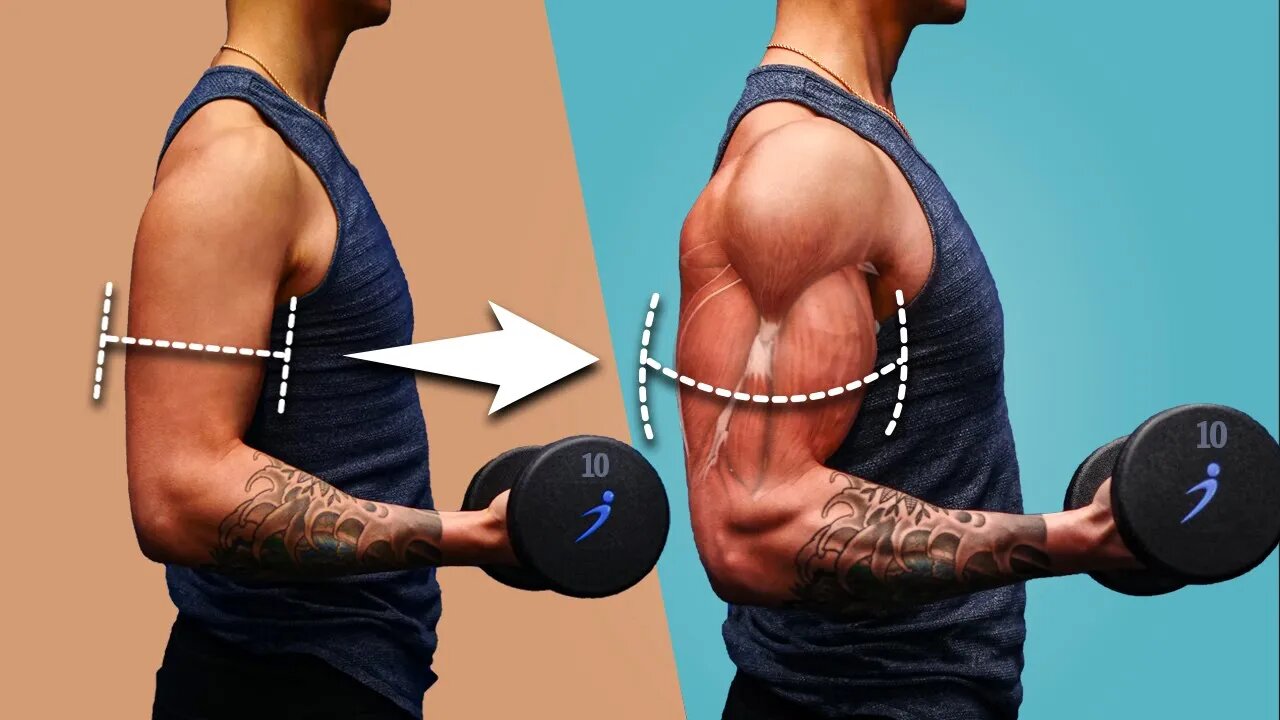Premium Only Content

How To FORCE Muscle Growth (5 Science-Based Methods)
How To FORCE Muscle Growth (5 Science-Based Methods)
When it comes to how to grow muscle, you need to continuously challenge them with more than they’re used to. In other words: you need progressive overload. As simple as this sounds, most people’s training don’t accomplish progressive overload. Sure they’ll get a good pump and sweat out of their workouts but they aren’t actually doing much to signal their muscles to grow overtime. To understand the importance of progressive overload for hypertrophy, you should first know how muscles grow. So let’s say we just finished a workout. Immediately after, our muscles don’t actually get stronger. In fact, it’s not until after a few days of proper recovery that they adapt to the damage we put them through. Meaning? For consistent gains overtime, your workouts need to be designed such that they literally force your muscles to grow every single session. So, today, we’ll cover the 5 types of progressive overload you must know.
Increasing the amount of weight lifted is the progressive overload method most people rely on. To apply it, it’s quite straightforward. Let’s say you can currently bench press 100lbs for 8 reps. Next week, you might try to increase the load and do 110lbs for 8 reps. That said, if you take our previous example of bench pressing 100lbs in week 1 and adding 10lbs of weight every week, at the end of the year theoretically you should be benching 620lbs. That’s impossible. This is where our next point comes in handy.
When applied properly, adding more reps is another great way to incorporate progressive overload into your training to force your muscles to grow. As long as you’re continuing to push hard, you can keep the same weight and increase all the way up to 30 reps and still get the same growth compared to adding more weight. This is helpful if you only have limited equipment or a nagging injury and can’t increase the weight on your lifts. However for those who do have access to more weights, consider double progression. However, again this often only works for so long. What happens when you get stuck unable to add more weight or do more reps?
The next method of progressive overload to stimulate hypertrophy has to do with how many sets you perform. However, while ee know doing at least 10 sets per muscle-group per week nearly doubles the amount of gains you would get from doing 5 sets per muscle group per week, there comes a point of diminishing returns when you get into the 20-30 set zone. A good rule of thumb is to increase volume no more than 10-20% per week. Then, once you get to the 20-30 set zone or just begin to feel quite fatigued, you can cycle back to the original program you started with.
The next two types of progressive overload are ways you can continue forcing your muscles to grow while lifting the same weight and doing the same number of reps and sets every week. First: if we slow down our reps, we can increase the amount of time that tension is placed on the muscle to stimulate more growth. This is especially effective for exercises involving smaller, weaker muscle groups like lateral raises where adding just a little bit of weight disproportionately often increases the difficulty, or bodyweight exercises like push-ups and pull-ups where adding weight may not even be an option. However, you want to avoid going too slow as that can provide the opposite effect and start to hinder muscle growth rather than boost it. Note: it seems that we can slow down our reps up to about 6 seconds total.
Oftentimes when people think they are challenging their muscles more by adding more weight to their lifts, they really just end up compromising their form in the process. Instead, realize that when it comes to how to grow muscle, if you do the same workout you did the week before, but you performed your exercises with better control, less momentum, and more activation of your target muscles, that is progression. Better form involves relying more on the target muscles and will result in growth even if all other variables remain the same.
Now as for which of these 5 methods is best and will provide the most growth, the truth is, it depends. It depends on your level of experience, your equipment availability, and if there’s a certain type of plateau you’re stuck in. The best way to find out is to experiment with them and see what works best for you. But if you’re looking for a step by step program that takes care of all the guesswork for you and ensures that week by week you’re challenging your body in the right way to consistently build muscle and lose fat, just take our analysis quiz to find out which of our programs is best for you and your body below:
https://builtwithscience.com/your-pot...
Subscribe to my channel here:
https://www.youtube.com/jeremyethier/...
-
 2:13:49
2:13:49
Melonie Mac
4 hours agoGo Boom Live Ep 36!
52.8K8 -
 1:02:11
1:02:11
Sarah Westall
4 hours agoFreezing USAID & its Operations in Ukraine: A Massive Money Laundering Organization? w/ Sam Anthony
58.7K5 -
 2:05:35
2:05:35
Space Ice
7 hours agoSpace Ice & Redeye: Neil Breen's Pass Thru
16.4K1 -
 1:00:23
1:00:23
The StoneZONE with Roger Stone
3 hours agoRoger Stone Talks Trump’s Electric First 100 Day Agenda | The StoneZone w/ Roger Stone
23.4K6 -
 DVR
DVR
Redacted News
7 hours agoBREAKING! EPSTEIN LIST INCOMING UNDER AG PAM BONDI? DEMOCRATS FREAKING OUT, PRINCE ANDREW NERVOUS
168K235 -
 52:02
52:02
Candace Show Podcast
9 hours agoBecoming Brigitte: An Inaccessible Past | Ep 2
157K228 -
 2:07:26
2:07:26
2 MIKES LIVE
7 hours ago2 MIKES LIVE #176 News Breakdown Wednesday!
26.5K2 -
 1:39:11
1:39:11
I_Came_With_Fire_Podcast
8 hours agoGAZA TAKEOVER | USAID EXPLAINED | TARIFF TAKEDOWN
45.9K8 -
 37:14
37:14
The Based Mother
9 hours ago $1.12 earnedFULL OF IT! Crooked politicians say they care about children. Their actions tell a different story.
27.5K5 -
 1:54:12
1:54:12
Right Side Broadcasting Network
12 hours agoLIVE: President Trump Signs EOs; Pete Hegseth Meets with Netanyahu - 2/5/25
134K48